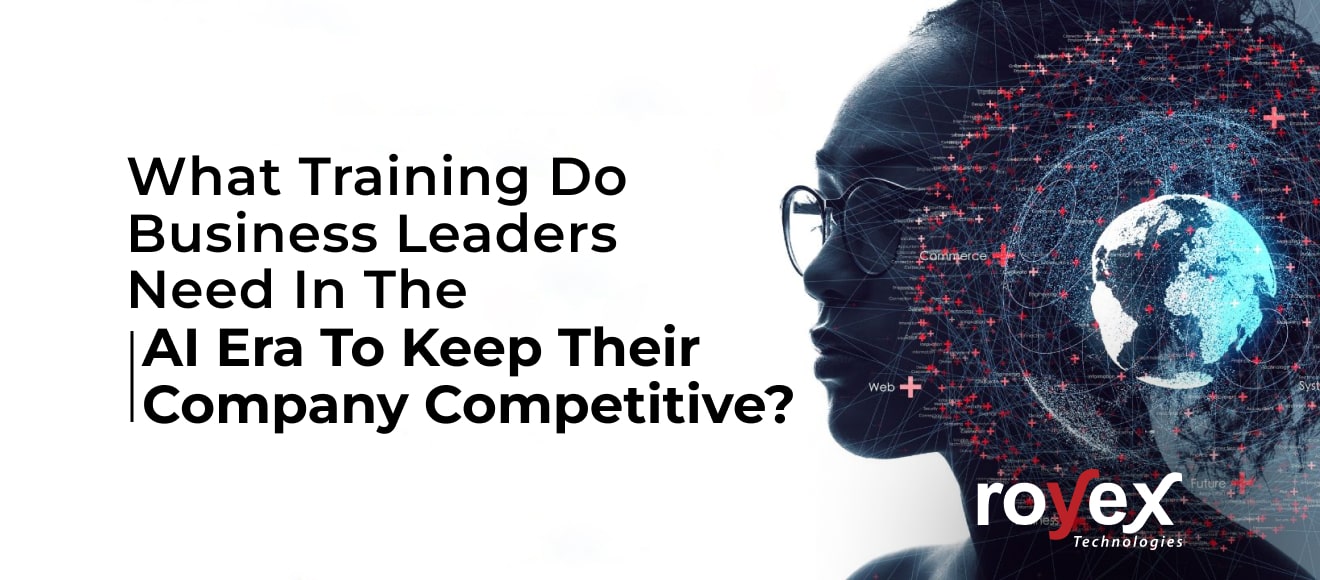
What Training Do Business Leaders Need in the AI Era to Keep Their Company Competitive?
We are experiencing a remarkable period of quick progress in technology, particularly in artificial intelligence (AI). AI is no longer an idea from science fiction – it's becoming crucial for businesses in every sector. This evolution brings both great prospects and significant changes that leaders must be ready for.
If you're a CEO, executive, manager or anyone in a leadership position, you cannot afford to fall behind as AI reshapes the business landscape. It is essential to update your skills and increase your knowledge to keep your company at the forefront and successful in this new era dominated by AI.
The surge of AI is approaching, and it will cause major disruptions. Organizations that are well-prepared with leaders who comprehend AI's impact will likely achieve unprecedented levels of success. However, those that are unprepared may fall against competitors who adeptly utilize AI. As a business leader, accessing proper training and education about AI should be a top priority.
AI Is Changing Everything
Chances are, AI is already impacting your industry and business operations in some way, even if it's not obvious yet. AI technologies like machine learning, computer vision, natural language processing and robotic process automation are being leveraged everywhere from improving sales and marketing efforts to streamlining supply chains, automating customer service and so much more.
The influence of AI is set to increase and become more disruptive over time. Business leaders who take the initiative to learn about AI capabilities and applications will gain significant advantages over their rivals who are unprepared. Now is the best time to begin learning about AI.
But What Exactly Should You Learn?
OK, so you realize AI education is critical - but where do you even start? The AI field can seem highly technical and intimidating from the outside. The good news is that you don't need to become a data scientist or machine learning expert yourself (unless you want to!). But there are some key areas business leaders absolutely must get trained on:
Understanding AI Fundamentals

First and foremost, before business leaders can start using AI in their operations effectively, they need to understand what AI is and how it operates. You don't have to earn a degree in computer science or data science for this purpose. The aim is not to make you an expert who can create AI systems on your own. Yet, understanding key ideas and terms like machine learning, neural networks, and natural processing is crucial. Knowing these basics helps you see past the marketing exaggerations and decide if an AI tool or system could indeed be valuable for the specific needs of your business.
Unfortunately, many traditional MBA programs and business schools are still behind in integrating AI education into their offerings. However, there's positive news, the growth of online courses, video tutorials, books, and self study resources now make it easier to learn the fundamentals of AI, even for individuals who don't have a technical background. When business leaders dedicate time to grasp basic AI concepts, they can keep up as this influential technology transforms various industries.
Integrating AI Throughout the Business
Once you've got those fundamental AI concepts down, the next big step is learning how to operationalize and integrate AI capabilities throughout all areas of your business. And I am not just talking about having chatbots on your website or using AI for targeted marketing. AI applications will inevitably spread into and transform every single department and business function - from supply chain logistics to manufacturing, customer service, finance, HR, you name it. As a leader, it's your job to take an active, hands-on role in identifying how AI can increase efficiency, reduce costs, drive new revenue opportunities and enhance processes across your entire organization.
This requires developing what could be called an "AI mindset" - a new way of viewing your operations, products, and challenges through an AI lens. For example, how could AI-powered predictive analytics optimize your inventory management? Could computer vision inspect product defects better than the human eye? How might natural language AI create better customer experiences? Gaining practical experience by implementing AI pilot projects within your company can be extremely beneficial. The goal is to find ways to enhance and surpass human skills throughout all areas of your business.
Ethical AI Leadership
While maximizing profits and performance will always be major priorities, responsible business leaders can no longer ignore ethical quandaries that come along with deploying AI systems. There are significant concerns around protecting data privacy as AI ingests huge amounts of personal information. Issues of algorithmic bias and discrimination in AI models making critical decisions like lending or hiring recommendations. The potential for AI automation to displace human workers and upend entire industries and labor forces. And bigger picture - what is the broader impact of ceding more decision-making power to machines? These aren't just philosophical debates, they are real-world risks that can heavily impact your company's reputation, regulatory standing, and very license to operate if not handled properly.
Being an ethical AI leader means proactively implementing robust governance practices around developing and using AI responsibly, with clear accountability and transparency baked in. This will require hands-on training to fully understand AI's potential pitfalls and frameworks for mitigating them across your AI systems and workforce. Clearly, dealing with ethics in AI is not simple and doesn’t have uniform solutions. However, all business leaders must directly confront this issue as AI increasingly becomes a common feature in our daily lives and markets.
Developing a Data-Driven Mindset

The old saying "garbage in, garbage out" is especially true when it comes to AI systems - they can only be as good as the data they are trained on.This is why it is crucial for business leaders to promote a culture focused on data across their companies to effectively use AI. Simply having a data science team is not sufficient. Leaders must establish strong practices for consistently collecting, storing, and managing data from all parts of the company. They need to invest significantly tools, technology, and skills needed to analyze this data and convert it into actionable insights. Moreover, they must encourage an approach where both large and small decisions are based on solid evidence rather than intuition or biased opinions. By 2025, data analysis and data literacy skills are projected to be some of the most in-demand capabilities for workers across all job roles according to the World Economic Forum's Future of Jobs report. Building this data-centric culture won't be easy, but it's an absolute must for avoiding "garbage in, garbage out" when it comes to AI.
Upskilling and Reskilling Your Workforce
One major task for leaders today is preparing their teams for the AI era. This involves training employees to work effectively with new AI technologies. Let's face it - AI automation may replace some jobs, but it will also create entirely new roles we haven't seen before. As a leader, must actively set up training programs to both enhance existing skills (upskill) and teach new skills (reskill) so employees can succeed with AI.
This means providing education to help your current employees at all levels understand how to effectively work with AI tools and automation in their day-to-day jobs, instead of fearing it. You'll need to reskill many existing workers with new capabilities like data literacy, AI monitoring, and algorithm auditing. And you'll have to hustle to hire and cultivate emerging AI talent like data scientists, machine learning engineers, AI ethics managers and more. Getting your human workforce AI-ready won't be easy, but it's essential to prevent skills gaps and stop human talent from becoming a competitive setback as AI technologies quickly advance. It's important to invest in continuous learning programs and encourage ongoing reskilling to keep your workforce prepared for the future.
Rethinking Business Models
Finally, one of the most important things for leaders is to understand that AI isn't just a productivity tool - it's a transformative force that will require fundamentally rethinking and adapting their entire business model. AI opens up all kinds of new opportunities for revenue streams, product and service innovations, novel customer experiences, and entirely new ways of delivering value that weren't possible before. Smart leaders will get creative about leveraging AI to augment their existing products and services, but they'll also need to think far bigger about venturing into completely new AI-driven business lines. According to a study by Accenture, by the year 2035 AI could boost labor productivity by a whopping 38% across all industries and job roles. That's an enormous competitive advantage waiting to be unlocked for companies bold enough to reimagine what their AI-enhanced business could look like from the ground up. But it will require letting go of legacy thinking and monumental culture change for even the biggest incumbents.
The AI era is already here, and it's ushering in one of the biggest workforce transformations since the industrial revolution. Business leaders who focus on AI training and education for themselves and their employees can stay ahead. This will help position their companies for success in a world increasingly influenced by AI.
AI offers a plethora of options suitable for various company sizes and financial capacities. Should you require internal expertise to navigate suitable tools for your business, consulting a leading artificial intelligence (AI) company in Dubai, like Royex Technologies, can prove invaluable.
Check our portfolio to see our previous works. Contact us via email at info@royex.net or call us at +971566027916. To get started with us.





